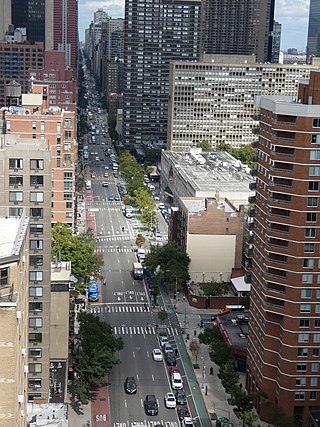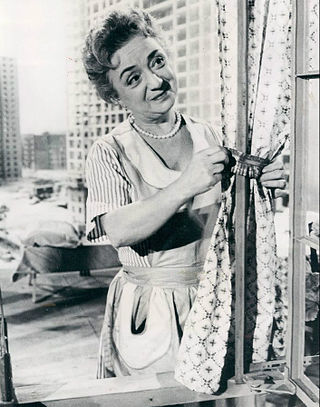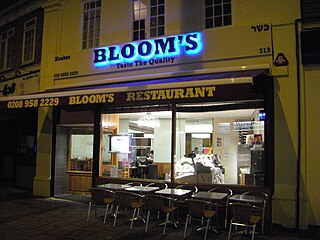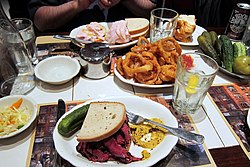
Katz's Delicatessen, also known as Katz's of New York City, is a kosher-style delicatessen at 205 East Houston Street, on the southwest corner of Houston and Ludlow Streets on the Lower East Side of Manhattan in New York City.

Second Avenue is located on the East Side of the New York City borough of Manhattan extending from Houston Street at its south end to the Harlem River Drive at 128th Street at its north end. A one-way street, vehicular traffic on Second Avenue runs southbound (downtown) only, except for a one-block segment of the avenue in Harlem. South of Houston Street, the roadway continues as Chrystie Street south to Canal Street.

Canter's Deli is a Jewish-style delicatessen, opened in 1931 in Boyle Heights, and later moved to the Fairfax District of Los Angeles, California, near the border of West Hollywood, where it is now. It has been frequented by many notable movie stars and celebrities.

Molly Picon was an American actress of stage, screen, radio and television, as well as a lyricist and dramatic storyteller.

The Carnegie Deli was a small Jewish delicatessen, formerly a chain, based in New York City. Its main branch, opened in 1937 near Carnegie Hall, was located at 854 7th Avenue in Midtown Manhattan. It closed on December 31, 2016. There is one branch still in operation at Madison Square Garden in Manhattan, and the deli still operates a wholesale distribution service.

A kosher restaurant or kosher deli is an establishment that serves food that complies with Jewish dietary laws (kashrut). These businesses, which also include diners, cafés, pizzerias, fast food, and cafeterias, and are frequently in listings together with kosher bakeries, butchers, caterers, and other similar places, differ from kosher-style businesses in that they operate under rabbinical supervision, which requires the observance of the laws of kashrut, as well as certain other Jewish laws, including the separation of meat and dairy.

Sharon Lebewohl is a restaurateur, lecturer, food consultant, cookbook author, and a guest instructor at The Institute of Culinary Education and New York's Jewish community Center. She is daughter of Abe Lebewohl, the restaurant entrepreneur and founder of the Second Avenue Deli in New York City.

Barney Greengrass is a restaurant, deli, and appetizing store at 541 Amsterdam Avenue on the Upper West Side of Manhattan, New York City, started in 1908. They specialize in smoked fish, more specifically sturgeon, but also have Nova Scotia salmon, whitefish, and others, and are very popular for brunch.

The Yiddish Theatre District, also called the Jewish Rialto and the Yiddish Realto, was the center of New York City's Yiddish theatre scene in the early 20th century. It was located primarily on Second Avenue, though it extended to Avenue B, between Houston Street and East 14th Street in the East Village in Manhattan. The District hosted performances in Yiddish of Jewish, Shakespearean, classic, and original plays, comedies, operettas, and dramas, as well as vaudeville, burlesque, and musical shows.

Brent's Delicatessen & Restaurant is a Jewish deli and restaurant located in Northridge, California. The restaurant was opened in 1967 and purchased by Ron Peskin in 1969 for $1700. The deli has expanded to a second location in Westlake Village, California.

Pastrami on rye is a sandwich comprising sliced pastrami on rye bread, often served with mustard and Kosher dill pickles. It was popularized in the Jewish delicatessens of New York City and has been described as New York's "signature sandwich". It was created in 1888 by the Lithuanian immigrant Sussman Volk, who served it at his deli on Delancey Street in Manhattan.

American Jewish cuisine comprises the food, cooking, and dining customs associated with American Jews. It was heavily influenced by the cuisine of Jewish immigrants who came to the United States from Eastern Europe around the turn of the 20th century. It was further developed in unique ways by the immigrants and their descendants, especially in New York City and other large metropolitan areas of the northeastern U.S.

A Jewish deli, also known as a Jewish delicatessen, is a delicatessen establishment that serves various traditional dishes in Ashkenazi Jewish cuisine. They are typically known for their sandwiches such as pastrami on rye, as well as their soups such as matzo ball soup, among other dishes. Most of these establishments are traditionally considered Ashkenazi. Like much of the Jewish cuisine stemming from the period of the Jewish diaspora, the emergence of the Jewish deli developed in accordance with local culture. These days, Jewish delicatessens serve a variety of Jewish dishes. While some delis have full kosher-certification, others operate in a kosher-style, refraining from mixing meat and dairy in the same dish, despite potentially using non-certified ingredients. There are also delis that serve food without adhering to any traditional Jewish dietary restrictions, offering non-Kosher dishes such as the Reuben sandwich.

Sarge's Delicatessen & Diner is a Jewish deli and kosher style restaurant in Manhattan. It was opened in 1964, on Third Avenue in Murray Hill, by Abe Katz, a retired New York City Police Department sergeant. Eater NY named it one of the 19 Vital Jewish Delis in NYC.

Liebman's Deli is a Jewish deli in Riverdale, New York and is the last-standing kosher deli in the Bronx. It was one of hundreds of kosher delis in the Bronx when it opened, but now is the sole representative of that cuisine in the borough. Liebman's was founded in 1953 by Joe Liebman and sold to Joseph Dekel in 1980. Yuval Dekel, his son, took over in 2002 when his father passed away. Dekel was previously a heavy metal drummer in a band, but now makes the pastrami and supervises the operation, along with his wife whom he met at the restaurant and now works there. The restaurant will open a location in Ardsley, New York. Liebman's is rated by Zagat and Michelin Guide. It was covered by Anthony Bourdain for Parts Unknown Liebman's is noted for their matzo ball soup and house-made pastrami, and Jewish delicacies such as stuffed derma, knishes, pickles, as well as kosher wine. It is frequented by Jewish New York Mets player Harrison Bader who grew up in nearby Bronxville, New York.

B&H Dairy is a kosher restaurant or luncheonette in the East Village of Manhattan in New York City. The original owners, Abie Bergson and Jack Heller, later Sol Hausman, opened it in 1938 when the area was known for the Yiddish Theatre District. Bergson was an aspiring actor, and Molly Picon and Maurice Schwartz were patrons. Bergson sold the luncheonette in the 1970s and it went bankrupt in 1978. Bob Sherman, a partner in a construction firm, bought it. A 1940s style lunch counter B&H serves cheese blintzes with sour cream, borscht, matzo brei, and other kosher dairy Jewish cuisine. It is owned and operated by an Egyptian Muslim and Catholic Polish couple, Fawzy and Alexandra Abdelwahed. It was closed for a time due to a gas explosion and a fire but reopened. It was noted in an interview by Lily Tomlin.

















